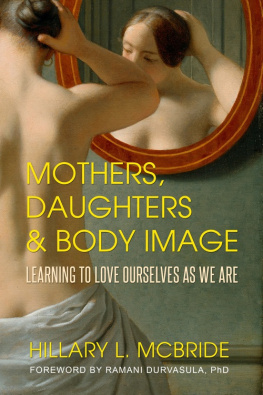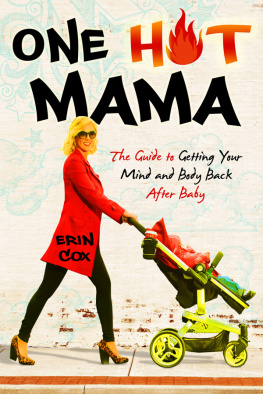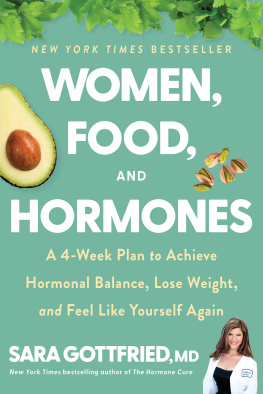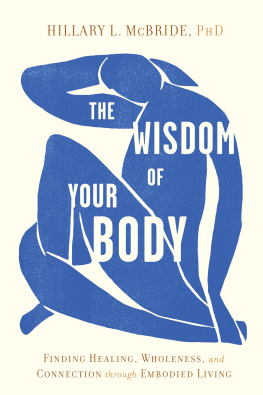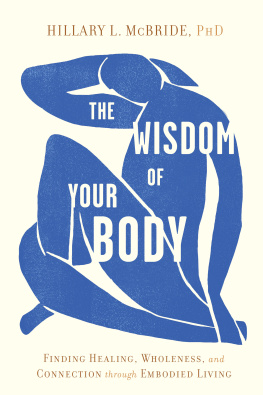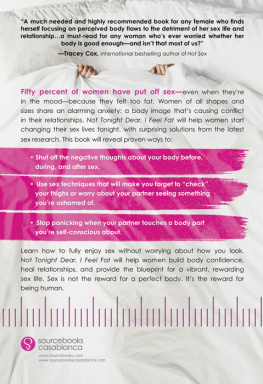A POST HILL PRESS BOOK
ISBN: 978-1-68261-354-2
ISBN (eBook): 978-1-68261-355-9
Mothers, Daughters, and Body Image:
Learning to Love Ourselves as We Are
2017 by Hillary L. McBride
All Rights Reserved
Cover Image: En ngen kvinde stter sit hr foran et spejl , by C.W. Eckersberg
No part of this book may be reproduced, stored in a retrieval system, or transmitted by any means without the written permission of the author and publisher.

Post Hill Press
New York Nashville
posthillpress.com
Published in the United States of America
SIX
STRENGTH: FEELING POWER IN THE BODY
I know no womanvirgin, mother, lesbian, married, celibatewhether she earns her keep as a housewife, a cocktail waitress, or a scanner of brain wavesfor whom her body is not a fundamental problem: its clouded meanings, its fertility, its desire, its so-called frigidity, its bloody speech, its silences, its changes and mutilations, its rapes and ripenings. There is for the first time today a possibility of converting our physicality into both knowledge and power.
ADRIENNE RICH, OF WOMAN BORN
W hen I was in elementary school, I wanted to play baseball like my older brother did. At that time, baseball in my town wasnt exclusively boys only, but there was an unwritten rule that boys played baseball, and girls played softball. But, my cool, smart, strong, older brother didnt play softball, he played baseball, and so would I. Before time for tryouts came, my dad and I would practice throwing and catching the ball. I had my own (eight-year-old-sized) glove which he helped me oil and break in, and we would watch my brothers baseball games together on warm spring nightstalking about who did what on the team, and who had good technique, and taking turns going to the concession stand for more licorice. Tryouts were held in a big school gym not far from my house, and to no ones surprise, I was the only girl who showed up. We had to demonstrate all the basicsand I remember every moment of it. It was my first tryout ever, and I was determined that I was not going to let my dad down. They had us sprint back and forth between cones, practice catching a ball, and in one exercise the coaches were on the other side of the gym rolling a ball across the floor, and we had to grab it and throw it back to them. When it came time for my turn to prove my skill, the coach rolled the ball towards me, but it was a little shortand I ran up to meet the ball and threw it back at him. Ill never forget when I was leaving the tryouts that day that my dad had his arm around me, and told me that I was the only one he saw that had run up to the ball when it rolled short, while some of the other kids had just stood there waiting for the ball to come to them, or for the coach to grab it to throw it again. My dad never said, you did well at that tryout for a girl, or because you were a girl. In my mind, and in my dads mind, I was just like anyone else therea kid who was trying out for the baseball team.
I was picked to be on a team I dont remember the name of now. Two other kids from my class at school were on my team, and so sometimes at school we would talk about games coming up, and what had happened at our practice the night before. But, a little while into the season, I started to learn from the boys on the team that I wasnt just another one of the kids who wanted to play baseball: I was a girl. And, to them that meant that I probably couldnt play baseball as well as them. There were several other boys on the team who were much better at playing baseball than me, and several who were much worse at it than me. But, when I didnt catch a fly ball, or when I struck out while batting, it was always because I was a girl, never for any other reason. I was performing just as well as lots of the other players. But, for some reason that didnt matter because I was a girl. I cant imagine that they learned to think that way on their own too, knowing the kinds of things that I heard them say behind my backthey were things that they had likely heard from older people, more sexist people, that they had picked up and said to me. One thing that they liked to point out in particular was that I had larger than normal hands for a girl of my age. This was something that when I was learning to play violin my teacher loved because it allowed melater onto play more technically advanced pieces of music with ease. But, when youre eight, and the only girl on a baseball team of prepubescent boys, I was definitely the easy target. I even earned myself a nickname for the size of my hands. For the most part I could take it all on the chin, but after one year of being up against the teasing and name-calling, I had learned that the boys didnt want me to be strong like them, or have grass stains on my uniform like they did. I learned that year that I could be tough and be like one of the boys, but it would cost me something. Even at eight, I knew I had better things to do with my time than be around people who didnt really want me there. I played lots of sports after that, but they were individual sports, or on a team of girls in high school.
Full disclosure, this is a memory that still stings with emotion when I talk or think about it, in both good ways and hard ways. But, I think that my story is like a story that most of us have encountered at some point as woman. As I sit here writing I can feel my chest fill with hope as I imagine a world one day where young girls could have a different story, or if they have the same story that they would be able to write a different ending to it. I was lucky enough to have parents who never told me I couldnt do something just because I was a girl (for an engagement present my dad bought me not my husband, a tool kit with all the essentials in it). And because of that, I was lucky to be able to try something that most other girls wouldnt be able to.
But, I still had to learn that even if Im ready to be strong, tough, and powerful as a female, that other people may not be ready for that, because it might threaten them. If for the boys on the team to know that theyre more masculine and manly than a girl they need to be more strong, tough, and powerful than a girl, it might make them feel insecure if Im just as strong, tough, and powerful as them. Before you rush too quickly into feeling bad for their insecurity, or maybe even questioning if I should be playing sports with the boys, why dont we blame instead the set of rules that limit boys and girls to certain things. I see those rigid rules as the real problem, in this case, not the rule-breakers. I know a lot of girls arent ever given the opportunity that I wasto try out for the sports team I wanted to play onbecause there are so many rules about what girls are supposed to do, or play, or be. And the backlash that so many girls face when they enter into typically boy or manly spaceseven their best is complimented in a backhanded kind of way. There is something painful about being told that youre good at it, for a girl that kind of takes away from the compliment altogether. Its a little like saying that dress is nice, for an ugly dresswhere the compliment is really a putdown at the same time. Those statements feel more like you will never be good enough, and no matter how strong your strong is, its not that strong than an actual compliment.
Because of these really specific rules, which influence practically everything we do from the moment we are born, we stop ourselves (or our daughters, or sisters, or friends) from doing things that as women were not supposed to do. I do think that this genuinely comes from a good place; were trying to protect ourselves (and our daughters, sisters, friends, etc.) from having the experience that I hadfeeling like you dont belong, being made fun of, and getting squeezed out. But, by trying to protect ourselves and others in this way, we actually get put at risk for another kind of pain. This is the pain of not ever knowing the fullness of life, or the pain of having to make ourselves uncomfortable, so others arent uncomfortable.
Next page
